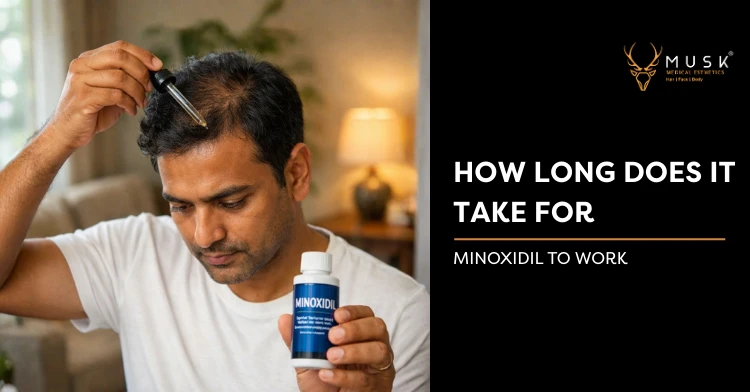Alopecia Areata Guide: What It Is, Causes, Symptoms, and Treatments

Suddenly discovering a smooth, coin-sized patch of hair loss can be unsettling. This unexpected hair loss is often caused by Alopecia Areata, an autoimmune condition where your body's own immune system mistakenly attacks its hair follicles. The good news is that it's a manageable condition, and in many cases, hair can grow back with the right approach and treatment.
Understanding this condition is the first step toward regaining control and confidence. At Musk Clinic, Ahmedabad, we specialize in diagnosing and treating complex hair loss conditions. Led by the internationally trained Dr. Anand B. Shah, our team combines advanced technology with a compassionate, patient-first approach to create personalized solutions that deliver real results.
What is Alopecia Areata?
Alopecia areata is an autoimmune disease that results in unpredictable, patchy hair loss. Think of your immune system as your body's security force. In people with alopecia areata, this security system gets confused and incorrectly identifies hair follicles as a threat, leading it to attack them. This attack causes the hair to fall out, typically in small, round patches.
It's crucial to understand that alopecia areata is not contagious. You cannot catch it from someone else, and it doesn't indicate that you are otherwise unhealthy. This condition can affect anyone, regardless of their age, gender, or ethnicity, and can appear anywhere on the body where hair grows.
The condition's defining characteristic is its unpredictability. For some, hair loss might be limited to a few small patches that regrow without intervention. For others, it can be more extensive and persistent, requiring a structured treatment plan to manage the symptoms and encourage regrowth.
What Causes Your Immune System to Attack Hair Follicles?
The precise reason why the immune system turns against healthy hair follicles remains a complex puzzle for scientists. However, research points to a combination of genetic predispositions and environmental factors that can trigger the condition's onset. Understanding these triggers is key to managing the condition effectively.
1. Is Alopecia Areata Hereditary?
Genetics play a significant role. If you have a close family member with alopecia areata, your risk of developing it is higher. Scientists have identified specific genes that are more common in people with the condition, suggesting a hereditary link that makes some individuals more susceptible to the autoimmune response.
2. Can Severe Stress Trigger Alopecia Areata?
While everyday stress is unlikely to cause alopecia areata, many individuals report their first episode after a period of extreme emotional or physical stress. A major life event, illness, or trauma can potentially act as a trigger that activates the underlying autoimmune condition in genetically predisposed people.
3. Are Other Autoimmune Conditions a Factor?
People with alopecia areata are sometimes more likely to have other autoimmune conditions. The presence of one autoimmune disease can increase the risk of developing another. Common co-occurring conditions include:
- Thyroid disease (like Hashimoto's thyroiditis)
- Vitiligo (a condition causing skin to lose its pigment)
- Type 1 diabetes
- Rheumatoid arthritis
- Lupus
What Are the Most Common Symptoms of Alopecia Areata?
The most recognizable symptom of alopecia areata is the sudden appearance of hairless patches. However, there are other subtle signs that a specialist can identify to confirm the diagnosis and rule out other types of hair loss.
1. How Does the Hair Loss Appear?
The primary symptom is one or more coin-sized, round or oval patches of hair loss on the scalp or other parts of the body. These patches are usually completely smooth and without any scarring or significant inflammation.
A classic diagnostic sign that dermatologists look for is the presence of "exclamation mark hairs." These are short, broken hairs that are narrower at the bottom, near the scalp, resembling an exclamation point. They are often found around the edges of a new patch.
2. Can Severe Stress Trigger Alopecia Areata?
Yes, while the scalp is the most common site, alopecia areata can affect any hair-bearing area. This includes:
- Eyebrows and Eyelashes: Hair loss can be partial or complete.
- Beard: Men may develop bald patches in their beard area.
- Body Hair: Hair on the arms, legs, and chest can also be affected.
3. Can Alopecia Affect Your Nails?
Interestingly, alopecia areata can also affect the fingernails and toenails. Changes to the nails can sometimes be the very first sign of the condition. Telltale signs include:
- Pitting: Tiny dents on the surface of the nail.
- Trachyonychia: Roughness of the nail surface.
- White spots or lines.
- Thinning and splitting of the nails.
How Does Alopecia Areata Progress?
The course of alopecia areata is highly individual and unpredictable. The patches of hair loss can appear suddenly, sometimes developing in just a few days. The condition can also cycle through periods of hair loss and spontaneous regrowth over many years.
Understanding the Different Types of Alopecia Areata
The condition is classified into different types based on the extent and pattern of hair loss.
- Alopecia Areata (Patchy): This is the most common form, characterized by one or more coin-sized bald patches on the scalp or body.
- Ophiasis Alopecia: In this type, hair loss occurs in a band-like pattern around the sides and back of the head.
- Alopecia Totalis: This involves the complete loss of all hair on the scalp.
- Alopecia Universalis: This is the most extensive form, resulting in the complete loss of hair on the entire body, including eyebrows, eyelashes, and body hair.
How is Alopecia Areata Diagnosed by a Specialist?
Because several conditions can cause patchy hair loss, getting an accurate diagnosis from a qualified specialist is essential. At Musk Clinic, our experts, led by Dr. Anand B. Shah, perform a thorough evaluation to confirm alopecia areata and create an effective treatment strategy.
What Happens During a Consultation?
Your consultation will begin with a detailed discussion about your medical history, family history, and the timeline of your hair loss. This is followed by a physical examination where the doctor will carefully inspect the areas of hair loss, your remaining hair, and your nails. A handheld instrument called a dermatoscope may be used to get a magnified view of your scalp and hair follicles.
Are Biopsies or Blood Tests Needed
In most cases, a diagnosis can be made based on the physical exam alone. However, if the diagnosis is uncertain, a scalp biopsy may be recommended. This involves taking a very small skin sample to examine the hair follicles under a microscope. Blood tests might also be ordered to check for signs of other autoimmune diseases, like thyroid disorders, which can be associated with alopecia areata.
What Are the Most Effective Treatments for Alopecia Areata?
While there is currently no cure for alopecia areata, several effective treatments are available to help manage the condition and stimulate hair regrowth. The goal of treatment is to suppress the immune system's attack on the follicles and encourage them to start producing hair again. At Musk Clinic, we believe in a
personalized approach, tailoring treatment to your age, the extent of your hair loss, and your specific needs.
Topical Treatments: The First Line of Defense
For mild, patchy alopecia, topical treatments applied directly to the skin are often the first recommendation.
- Corticosteroids: These anti-inflammatory medications come in creams, lotions, or foams. They work by calming the immune response in the affected area.
- Minoxidil (Rogaine®): While not an anti-inflammatory, this well-known hair growth stimulant can be used alongside other treatments to help speed up the regrowth process.
- Anthralin: This is a topical medication that alters the skin's immune function. It's applied to the patches for a short period and then washed off.
Injections for More Targeted Action
For one or a few small patches of hair loss, corticosteroid injections are a very common and effective treatment. A dermatologist injects the steroid directly into the bald patches on the scalp. The injections are typically repeated every 4 to 6 weeks and can produce visible regrowth within a few months.
Oral Medications for Widespread Hair Loss
When hair loss is more extensive, a doctor may prescribe oral medications.
- Oral Corticosteroids: Pills like prednisone can be effective for severe alopecia, but they are used cautiously for short periods due to potential side effects.
- JAK Inhibitors: This is the most exciting breakthrough in alopecia areata treatment. Oral medications like Baricitinib (Olumiant®) and Ritlecitinib (Litfulo™) are FDA-approved to treat severe cases. They work by blocking specific immune pathways (the Janus kinase pathway) to stop the attack on the hair follicles.
Advanced Therapies and Light Treatment
Innovative therapies that can complement traditional treatments.
- Platelet-Rich Plasma (PRP) Therapy: This is a leading non-surgical treatment we offer at Musk Clinic where the concentration of your own blood platelets is injected directly into the scalp. This powerful substance, PRP, is rich in natural growth factors that can help stimulate dormant hair follicles and promote healing, making it a highly promising option for encouraging regrowth.
- Phototherapy: Also known as light therapy, this treatment uses ultraviolet (UV) light to suppress the immune cells in the skin. It is typically reserved for those who cannot use or haven't responded to other treatments.
Can Hair Grow Back After Alopecia Areata?
Yes, for many people, hair can and does grow back. The regrowth can be spontaneous, even without treatment, especially in milder cases. However, the journey is often unpredictable. When hair first regrows, it may be very fine and lack pigment, appearing white or grey. Over time, it usually regains its original color and texture.
It's important to have realistic expectations. The condition can go into remission for long periods, but flare-ups can occur. Consistent management and a strong support system are key to navigating the ups and downs of living with alopecia areata.
How Can You Cope with the Emotional Impact of Alopecia?
Living in a condition that affects your appearance can be emotionally challenging. The unpredictable nature of alopecia areata can lead to feelings of anxiety, frustration, and a loss of self-esteem. Acknowledging these feelings is a vital part of the coping process.
Finding Support Systems
You don't have to go through this alone. Connecting with others who understand can make a huge difference. Consider joining online forums or local support groups for people with alopecia areata. Talking openly with friends, family, or a mental health professional can also provide much-needed emotional relief.
Cosmetic and Styling Solutions
Why Choose Musk Clinic for Alopecia Areata Treatment in Ahmedabad?
Navigating alopecia areata requires expert medical guidance and a supportive environment. At Musk Clinic, we provide both. Our approach is built on a foundation of deep expertise, advanced technology, and a genuine commitment to our patients' well-being.
- Expert Diagnosis and Leadership: Your care is overseen by Dr. Anand B. Shah, a board-certified Maxillofacial and Craniofacial surgeon with extensive international training under world-renowned pioneers in hair restoration. His expertise ensures you receive a precise diagnosis and a world-class treatment plan.
- Personalized Treatment Plans: We understand that every patient's journey with alopecia is unique. We don't believe in a one-size-fits-all solution. Instead, we perform a comprehensive evaluation to design a customized treatment plan that addresses your specific type of hair loss, your health, and your personal goals.
- Advanced USFDA-Approved Technology: We are committed to patient safety and efficacy, using only USFDA-approved technologies and treatments. From advanced diagnostic tools to innovative therapies like PRP, our clinic is equipped with state-of-the-art technology to provide the best possible care.
- The "Musk Experience": We know that treating hair loss is about more than just medicine; it's about restoring confidence. Our compassionate team provides continuous support, education, and encouragement throughout your journey, ensuring you feel cared for and valued from your first consultation to your final result. This is the holistic approach we call the "Musk Experience."
Your Path Forward with Alopecia Areata
Alopecia areata can be a challenging journey, but it is a manageable one. With a proper diagnosis, effective treatments, and a strong support network, you can navigate this condition successfully. The key is to seek expert care early to explore your options and find a plan that works for you.
At Musk Clinic, we are dedicated to helping you understand your condition and achieve the best possible outcome. Our blend of cutting-edge science and patient-centered care makes us a leading destination for hair loss treatment in Ahmedabad and beyond. Contact us today to begin your journey toward renewed confidence
FAQs

Dr. Anand B. Shah
- 10 Years of Experience
Dr Anand B. Shah, is a board-certified Maxillofacial & Craniofacial surgeon who is highly skilled in cosmetic facial and hair restoration surgery and has exclusively practised the same, internationally and nationally.











